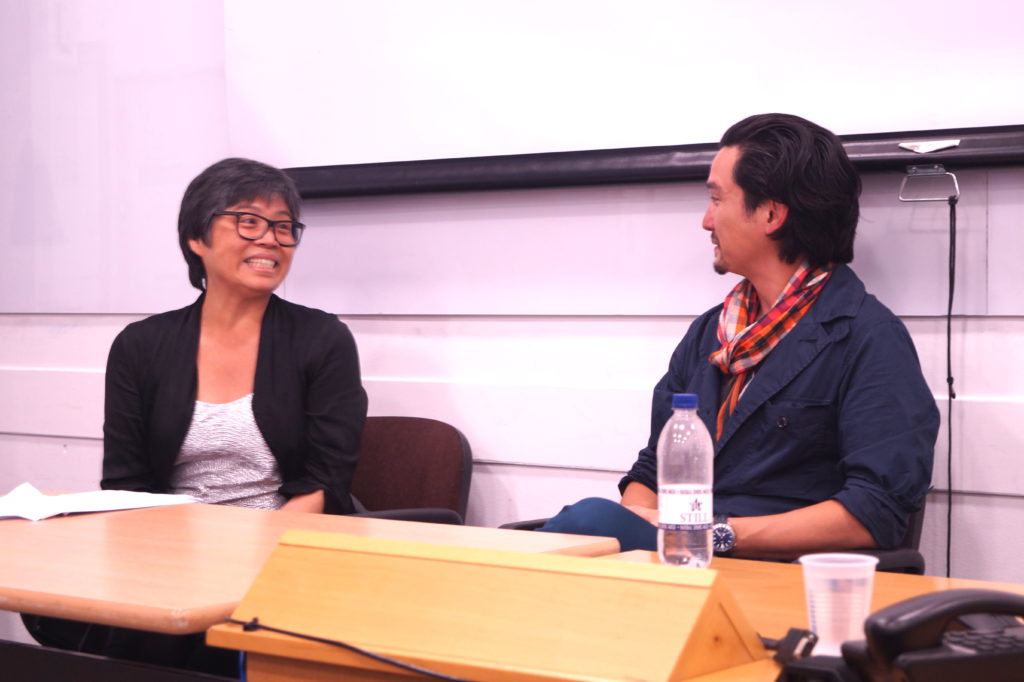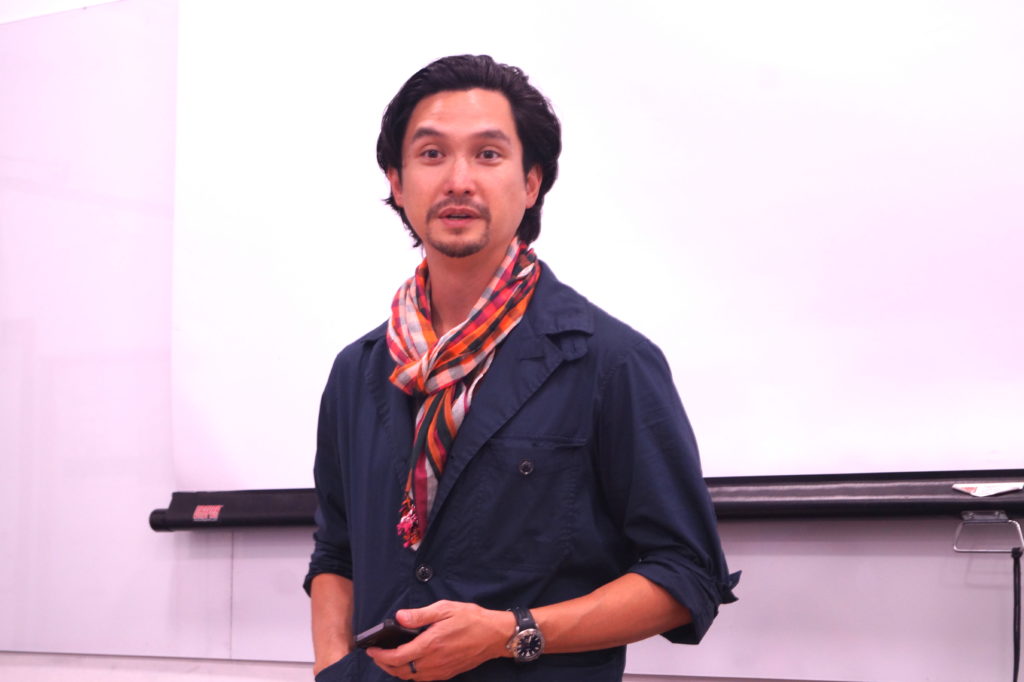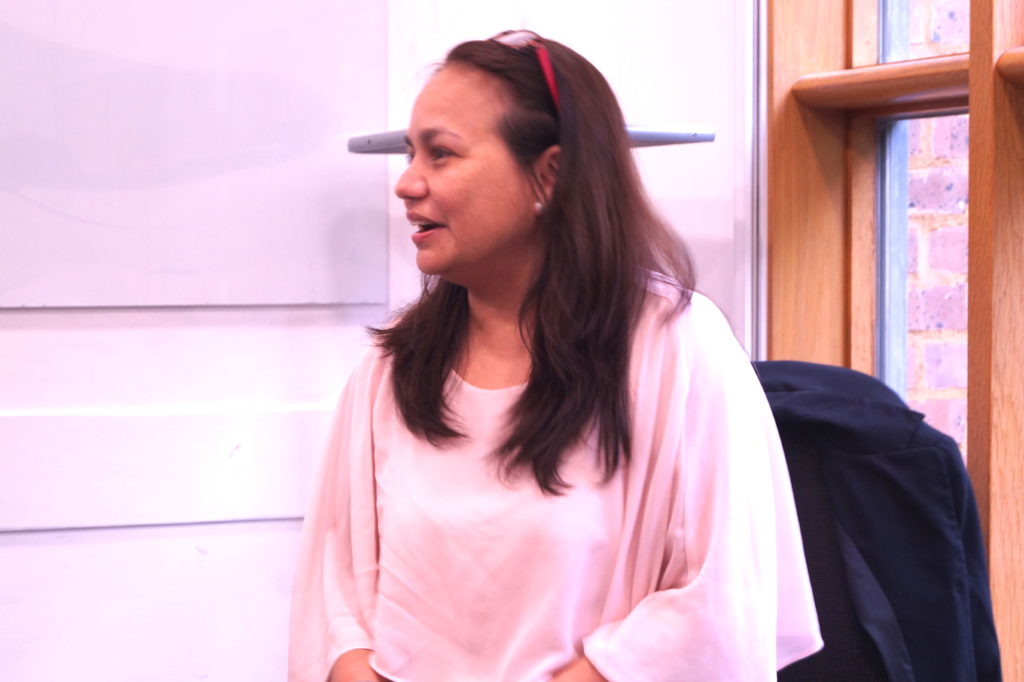In London, authors mull PH fiction, journalism in the ‘strongman’ era

Authors Candy Gourlay and Miguel Syjuco at School of Asian Studies panel in London. INQUIRER/Melissa Alcantara
LONDON– A panel discussion explored “Truth and Fiction in the age of the Strongman: Filipino writers on Rodrigo Duterte’s Philippines” last Monday, June 5 at the School of Oriental and Asian Studies (SOAS) here.
Filipino journalist and professor Miguel Syjuco, whose debut novel Ilustrado won the Man Asian Literary Prize and Palanca award, and UK-based Filipino writer Candy Gourlay, whose debut novel, “Tall Story” won the National Children’s Book Award of the Philippines and Crystal Kite Award for Europe, made up the panel.
Organized by academic Dr. Cristina Juan, the writers considered the interconnectivity between Philippine fiction and journalism under Duterte’s unique brand of nationalism, tokhang and schizophrenic populism.
Art as vital to democracy
Syjuco, who observes Philippine politics in a column for the New York Times International, opened with a keynote reading of his article entitled, “Art and literature are vital to democracy,” penned originally for the World Economic Forum 2017 in Phnom Penh, Cambodia.
Syjuco ultimately highlighted the function of art as an empowering tool for change, explaining the crucial role art has historically played in achieving democracy.
He first questioned the practicality of his craft – “is what I do useful, or relevant to everyone – or is it simply luxurious?” However, these reflective questions soon segued into a well-evidenced discourse on art as a defiant form of “speaking out,” making the case that freedom of expression is the best kind of foil to authorities and governments that seek to stifle free speech and control history.

Miguel Syjuco, author of Ilustrado. INQUIRER/Melissa Alcantara
Syjuco also mentioned a critical finding on his course “Novels that Changed the World,” taught at NYU Abu Dhabi, which studies international works of literature spanning over a century: “My students discovered that each novel on our reading list spoke against the injustices of its time, and in doing so highlighted the injustices of today. We found in every book a stubborn insistence on speaking out.”
Silence implies consent
“Silence, it is said, implies consent. But that’s only half the story. Silence also confirms oppression, because the ability to speak out is too often a luxury of the privileged.”
As such, Syjuco has shelved the “long game” of fiction writing to “join the trenches” in journalism, using the immediacy of this art to “speak out” on behalf of those silenced. But in our era of fake news, the activist writer needed his words, which could help tokhang victims locked in “a terribly corrupt justice system,”to be informed.
“I go and visit slums, widows, lawyers, judges, protests, local barangays. I use my own dime, my own savings, to fly out and visit them. I need to see everything, the truth, with my own eyes.”
“Write who you are”
Candy Gourlay, whose journalistic work in the mid-‘80s at weekly opposition Filipino tabloid Mr & Ms Special Edition (now Philippine Daily Inquirer) played a significant role in overthrowing the regime of dictator Ferdinand Marcos, followed next.
Gourlay spoke of her journey towards seeking personal and universal truths in her writing, both as a journalist and as a fiction novelist, and their relationship to the hazardous political and media narratives in existence today.
She recalled her childhood in Cubao, Quezon City, reading books imported from England and America: “They were about pink-skinned kids in brick houses with green grassy lawns. I never saw myself in them. So I never thought Filipinos belonged in books.”
“At first, I didn’t know how to mine the aches and pains that make a story rich. Write who you are – that’s what I’ve learned.”
Drawing upon her childhood memories of being left behind by a father who went abroad to seek work, and her adult memories of marrying an Englishman and moving to London, Gourley started writing from her own experiences of abandonment, being left behind and the surprise of being an outsider, an “other.”
Gourlay soon developed a truth-led storytelling mantra of “windows and mirrors”: “Children’s books should be not just windows to other worlds for them, but mirrors that reflect their own experience.”
Gourlay recounted a memory of visiting a class of Filipino teenagers to discuss her first novel. At the end of the talk, they queued up, one by one, to take her hand and press it lightly against their foreheads – mano po. It was first time these Filipino children, born in Britain, had seen themselves represented.
Telling truths
She went on to recall her sense of shame at misrepresenting Filipinos when writing for foreign newspapers in the Philippines. She admitted to purposefully scouting out stories that were not so much objective as racially fetishizing, whereby her articles about Philippine traditions morphed into bizarre and dehumanizing tales from an exotic land to be read about by western eyes.
This sense of shame haunted her again when starting her new novel set in Bontoc during the Philippine-American War. The tale was originally going to follow a Bontoc boy being paraded like a zoo animal around the U.S., but Gourlay realized that this perspective would be a disservice to her character’s (and country’s) humanity, perpetuating the sad truth, as Syjuco mentioned, that Philippine history “has always been written by its victors.”
While compiling research, Gourlay found only two records of Bontoc in the 1880s, both written by Americans, full of “quite racist detail.” But one diary entry about a local boy confirmed what she’d been seeking all along: that children in Bontoc were just like any other in the world – happy, wonderful, full of life. Finding this truth opened up a new story for Gourlay to tell, which took her six years to write.
Gourlay closed her speech by questioning her role as a fiction writer in the ‘post-truth era,” later saying on her blog: “Now novelists like me are trying to fill in the gaps, to show that there is a possibility of a more complex, more human narrative from that era. But is there truth in it if I’m making up voices in a voiceless era? That is the challenge.”
Stranger than fiction
The evening’s discussion recalled a roundtable, “How to Write TV in the Age of Trump” published in the New York Times, featuring writers such as Shonda Rhimes (“Scandal”) and Frank Pugliese and Melissa James Gibson (“House of Cards”).
In the roundtable, the writers described the uncanny horror of realizing that truth, reality, had become stranger than fiction.
Similarly, this overlap of truth and fiction exists in the manuscript of Syjuco’s second novel, which features the rise of a starlet who employs her sexuality to become the mistress of the President, a boxer-actor-turned-politician.
Despite starting it before 2016, the writer said he put the manuscript on the backburner, because it was too close to home.
“If I published it now, people would say I based it on current political figures,” said Syjuco.
Fact or fiction?
The writers went on to discuss the idea of voicelessness – long borne by a stifling government, an ignorant “Manila elite,” and a tightly-controlled media.
This sense of voicelessness, they agreed, gave rise to the abuse of social media and especially, fake news.
“The proliferation of fake news today is deeply troubling,” said Syjuco. “I called someone out on Facebook for posting fake news and – can you believe this – he replied, ‘it’s not about the facts, it’s about the message!’”
Syjuco postulated that since history is written by the victors, it guarantees that they remain the victors. “Eighty per cent of higher elected offices in the Philippines are in dynasty hands. These family businesses that will always present a conflict of interest between kin and country. The story is theirs to tell.”
The danger, he warned, “is when such corrupted stories are believed by others” – and he expressed his belief that in the Philippines, “a subtle war is taking place – one of narrative, [backed by] righteousness.”
Gourlay mentioned a hobby of hers – editing Wikipedia pages. On the page of Ferdinand Marcos, she says, she became embroiled in a digital battle of words, of truth, of altering history. She noticed that someone kept changing the word “dictator” to “strongman.” Gourlay would change it back, someone else would change it back – the very act that Syjuco warned of.
“Truths are compelling, individually,” Gourlay said in agreement. “Are there many truths? Is there one truth? I mean, the truths of those pro-Duterte are as compelling as the truths of those against him.”
The writer’s duty
At the end of the panel, differing “duties” emerged for Gourlay and Syjuco as writers in today’s media world, where the lines between truth and fiction are so blurred.

Dr. Cristina Juan organized the SOAS panel. INQUIRER/Melissa Alcantara
Gourlay feels a duty to create more introspective fiction borne of humanity and representation, humanizing the other, holding mirrors up to her young readers.
She quoted Butch Dalisay, her favorite short story writer, to make her point. In reponse to dehumanization and stereotyping in times of terror, Dalisay said: “The two most important words in our verbal armory are not even ‘truth’ or ‘justice’ – it’s ‘What if’?”
Syjuco, on the other hand, feels a duty to shed light and truth on matters of literal life and death through the “short game” medium of journalism – and has opened his Facebook page up to the public, leaving him vulnerable to attacks from trolls, in the hope that he can help others.
“As leaders increasingly justify their abusive powers, we can’t trust our ‘leaders’ do tell the truth for us,” the writer said. “Maybe we have to go and see for ourselves, go and talk and understand. It’s a very Catholic idea that there’s one savior.”
In both cases, both writers will continue to use their art, their words, to tell their truths – whatever truths they may be.














